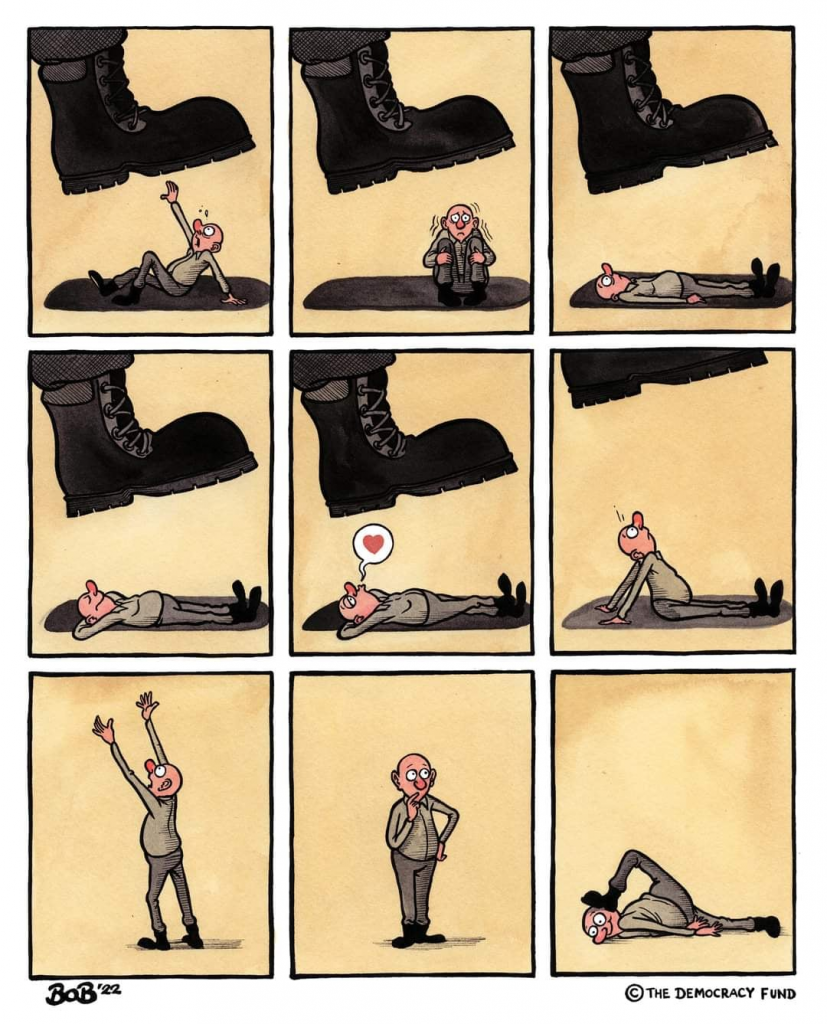Lately I’ve been thinking a bit about the people who insist that the US maintain all the Wuflu ridiculousness that has been “required” for the last two years. These are people who scream that they’re never patronizing their favorite restaurant again because it no longer requires masking inside. They still scream about social distancing. They double-mask when in stores or other public indoor spaces, they wear gloves when out and about. They’re still freaking out about friends and family who are not vaccinated. It’s as if they’re afraid to take up their previous lives again.
Well, in a way, they are afraid to go back to normal. For many people, the lockdown and subsequent regulations defining how we were supposed to live our lives, provided a much needed structure. Much needed by them. While they may have whinged and moaned about the restrictions in public, they were quietly enamored with them. Now they knew that everybody would behave the same way. No more deviations (well, except for those fiery but peaceful protests… but hey. Their cause was sincere.) Best of all, they could loudly and publicly remind everybody of the regulations, because after all, everybody’s safety and health were at stake.
Even when all the data and evidence showed that not to be true.
These are the same people who, if they’d lived in the former Soviet Union or in former Yugoslavia would have been yearning for the good old days of communism today. “Oh, of course terrible things happened,” they would say, and do say. “But at least everybody was fed/sheltered/had a job.” What they mean is, “I didn’t have to take responsibility for my circumstances, and I could blame all my poor decisions on the state.” And all of this completely ignores the horrors of the gulag, Lubyanka, Stasi, etc.
A Serbian friend of mine posted this cartoon the other day.

My friend spent years protesting against the Milosevic regime. He knows people who are upset that the regime put in place by Tito is gone. He shakes his head, but he knows why. They enjoyed the power of conformity. Freedom to make your own decisions carries with it the responsibility for the outcome of those decisions. That’s scary.
The people who are upset and angry with the elimination of Wuflu “protocols” are the same as the people who were upset at the collapse of the communist regimes. They long to bring it all back.
But wait, you say. These are Americans. They’d never want to live under a communist regime!
Really? You’re sure of that? Because they all like having power, even if it’s only the power to feel righteous as they scream at their neighbors for not masking while outside. The power to get somebody fired from a job because they didn’t want to be part of an uninformed medical experiment. Or get somebody fired because while that person did get jabbed, or they did but they didn’t want to turn over that information to their employer. The power to cut off family and friends in their ongoing quest to prove that they are a much better person than those rule-flaunting, life-threatening, knuckle-dragging troglodytes.
Power. The people who are upset at the loss of Wuflu restrictions are upset because they see it as a loss of power. Yes, power for themselves. They may not have had any but the small petty power to harass their neighbors (or as they probably saw it, educate their neighbors… at the top of their lungs). But they aspired to the greater levels of power. They saw what the political and bureaucratic actors were doing and not doing. They saw Gavin Newsome create new rules and regulations and then promptly flaunt them at the French Laundry. They saw Fauci pronounce doom and gloom for not wearing a mask, and then sit in the stands with friends at a ballgame, not wearing a mask. They saw London Breed maskless at a night club. They saw all their “betters” flaunting rules and regulations that they were dutifully following. They wanted the power to do that and maintain moral superiority.
For some of us, this rule flaunting simply made clear the Wuflu protocols were all theater and that the politicians and bureaucrats were laughing at us.
Those who loved the restrictions saw all of this and more, and realized that if they could work it right, they too could impose rules and regulations and then flaunt them when necessary while still collecting the social credit points for supporting the useless rules and regulations. They could put the boot on their own head and get credit for doing so.
Petty or writ large, it’s all about power over others. The power of knowing everybody thinks like you do. The power of making certain that all conform… just like they did. The power of knowing there are no more individuals left who will argue with them and point out the inconsistencies in their statements.
Remember that the next time somebody tries to explain why you must conform to their view of the world even if that world view goes completely against everything you believe in or everything you can see with your own two eyes.
It’s for the love of the boot and the power it brings.
Image by PublicDomainPictures from Pixabay


I’d like to put boots up their asses.
I think I need to send to this to $Aunt who thinks I need the n-th ClotShot… because “You have a heart condition!” (Yes, and DAMN SURE DO NOT NEED ANOTHER ONE!!!)
Oh, gawd. But I’m sure she won’t recognize herself in here…
Orvan, I fear that $Aunt is one of the people who answers YES to “Could you continue to miss the point if I impaled you on it?”
My condolences.
To her credit, the ClotShot seems to be ONLY thing she went on about. The rest, evidently there is Selective Sanity.
So true.
The drawing is by Bob Moran in the UK. He’s nailed quite a few recent events – see more of his work at: https://www.bobmoran.co.uk/downloads-1
“Where’s Trudo” is still my favorite, although the latest mask drawing is totally on point.
Thanks for the link!
Would have been a better article if you hadn’t several times written “flaunt” when you meant “flout”.
They are different words. Look them up.
Perhaps before you go all arrogant and wrong in public *you* should look up the word you’re upset with. “Flaunt” as a verb means “to ignore or disdain.”
Look it up.
https://www.dictionary.com/browse/flaunt
As someone who hates the uses of “gauntlet” when “gantlet” is more appropriate, my eyes did roll under the couch. Must retrieve them before the puppy gets up.
https://www.merriam-webster.com/words-at-play/is-it-wrong-to-confuse-flaunt-and-flout
Common usage is perfectly fine; language changes. And arrogance is still arrogance.
But wait, you say. These are Americans. They’d never want to live under a communist regime!
One of the most egregious things ever said by George Bush (the Younger) was that everyone everywhere just wants them some freedom! (I’m paraphrasing.)
It’s a lie. Almost all people, everywhere, want security and lack of responsibility above all else. And security here is defined as “no stresses on my life – economic, social, or physical.” They will gladly trade freedom – which requires responsibility and runs a risk of making the wrong decision – for security and someone else’s decision making. It’s part of the sinful human condition. It has to be overcome to turn out people who actually like and desire true freedom.
America started partly as a collection of people who were those outliers and sought to get out from under the control of others (at least, in certain areas). And they fed their children with that idea. And those children their children, etc. But a great deal of comfort comes from the activities driven by such people. And comfort breeds lethargy – momentum takes over. And soon, those people 1) have leisure time to come up with lots of stupid ideas and 2) they feel no need to teach their children and grand-children. And soon, you end up where we are, walking towards the finish line, after a very strong start and a huge lead in the race.
crab buckets.
Nah. Flout and flaunt are different words. Just because people use them incorrectly doesn’t make it right.
I think there are some interrelated themes that have been emerging as of late (they’ve always been there, just becoming obvious in America). “Nostalgie de la bue” or “yearning for the mud” is a recurring idea of a spoiled populous desiring an “authentic” struggle, e.g. people moving to New York wanting a seedy 70’s type of experience. Currently that’s what’s happening there and now that they’ve gotten their wish realizing they are painfully ill equipped to deal with the consequences they have wrought. I think “love of the boot” works the same way in that we are built for struggle and when we are too comfortable we will create conflict for ourselves. Longing for unnecessary obstacles, wishing for a righteous battle in lieu of a real one. A puritanical cause celebre, a self inflicted moral crusade. It is the root of wokeness. There seems to be a hidden imperative so deep in our programming of being dissatisfied, that we will destroy the status quo even when it’s good (especially when it’s good).